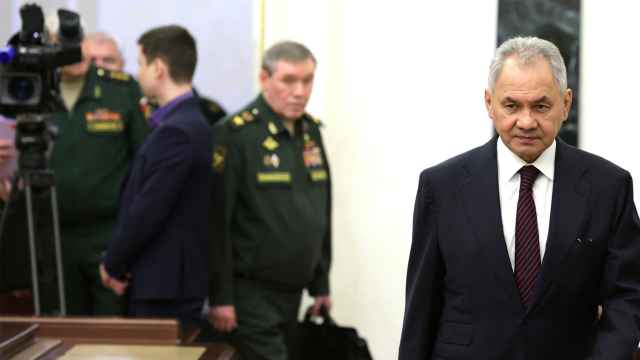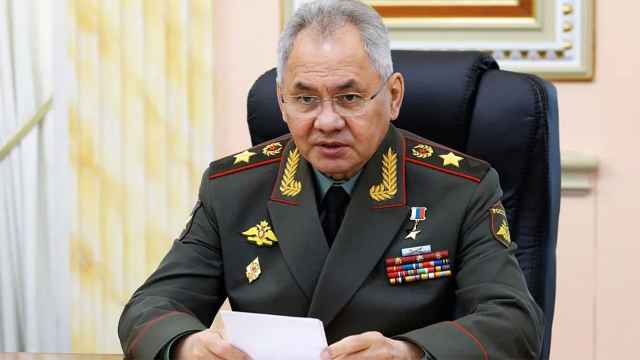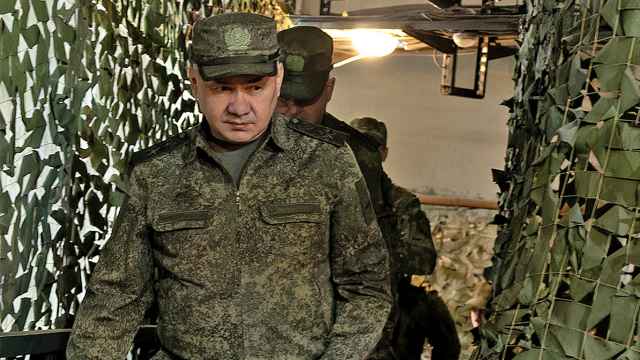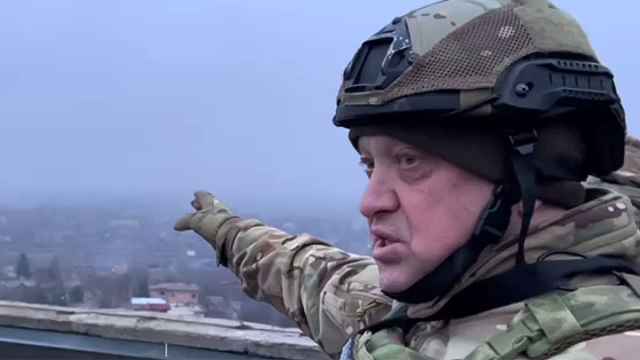They have sun-bathed bare-chested together in remote Siberia, shared fishing holidays and played on the same ice hockey team.
Russia's long-serving Defense Minister Sergei Shoigu has long been seen not just as a political ally of President Vladimir Putin but one of the Kremlin chief's few friends within the Russian elite.
But their bromance and Shoigu's decades-long political career now face their biggest test after the revolt led by Wagner mercenary group chief Yevgeny Prigozhin, who had lambasted the defense minister's handling of the invasion of Ukraine.
Putin appears to have for now survived the revolt after a surprise mediation led by Belarusian President Alexander Lukashenko. But Shoigu's position remains deeply precarious due to the unprecedented severity of the attacks by Prigozhin against him and his ministry.
Prigozhin succeeded in capturing the Russian army's southern command headquarters in Rostov-on-Don, the nerve center of the invasion of Ukraine, and accused Shoigu of fleeing "like a coward" and vowing he "will be stopped."
The minister of defense was nowhere to be seen at the time and has, for the moment, completely vanished from public view.
The Wagner chief had previously accused Shoigu and Russia's top General Valery Gerasimov, his other bete noire, of being responsible for the deaths of "tens of thousands of Russians" in the conflict and the "surrender of territory to the enemy."
'Big loser'
"The big winner of the night was Lukashenko," said Arnaud Dubien, director of the Franco-Russian Observatory think tank. "The big loser was Shoigu."
But even before the revolt broke out on Friday night, Shoigu had been under immense pressure due to Prigozhin's attacks and the failure of the Russian Armed Forces to make progress.
On June 12 a video was widely shared, with Putin and Shoigu attending a handing out of medals at a military hospital, where the Russian president was shown turning his back on the defense minister in apparent disdain.
Shoigu has had a career of unmatched political longevity in post-Soviet Russia and his presence at the center of power in Moscow predates that of Putin himself.
Hailing from the Tuva region of southern Siberia, Shoigu is among the few non-ethnic Russians to have occupied a top post in government after the collapse of the U.S.S.R.
He began his ascent in 1994 when he was appointed emergency situations minister in the early years of the presidency of Boris Yeltsin.
Shoigu became a familiar and unflappable presence for Russians, as well as one of the country's most popular politicians, as he raced around the country to deal with disasters ranging from plane crashes to earthquakes.
Serving under a dozen prime ministers, he held that post until 2012, when he was appointed governor of the Moscow region before swiftly being named defense minister by Putin the same year after a corruption scandal felled his predecessor Anatoly Serdyukov.
'Verge of collapse'
He was immediately named a general, despite having no high-level military experience, but successfully oversaw operations including the 2015 intervention in Syria which has kept Moscow's ally Bashar al-Assad in power.
For his 65th birthday, Putin had a special present for his friend, one of Russia's highest decorations, the "For Merit to the Fatherland" medal to add to a chest already stuffed with decorations.
But the far less successful invasion of Ukraine — which the Kremlin initially hoped would see Russian tanks roll into Kyiv — has persistently raised questions about his future.
"Prigozhin wanted to send the message that Shoigu and Gerasimov must be fired because they are incompetent and a change of strategy is needed," said Pierre Razoux, academic director of the France-based Mediterranean Foundation of Strategic Studies (FMES).
There are no more expressions of macho friendship or pictures as in 2017 of the two men with their shirts off bronzing their chests by a river on the Siberian taiga.
Instead, Shoigu has been reduced to mumbling encounters reporting to Putin or simply consigned to a video screen as the Kremlin chief oversees a video conference.
Prigozhin has also taken aim at Shoigu's family, in particular the husband of his daughter Ksenia, Alexei Stolyarov, a fitness blogger who has steered well clear of the war and has been accused by opposition media of liking a post opposing the invasion.
Russian-language Telegram channels have fizzed with speculation over who could succeed Shoigu, with the governor of the Tula region Alexei Dyumin, who has held top army and presidential security posts, seen as a favorite.
"Shoigu's group is on the verge of collapse, and Sergei Kuzhugetovich himself is in disgrace and, most likely, will resign," said the widely followed Telegram channel Preemnik.
A Message from The Moscow Times:
Dear readers,
We are facing unprecedented challenges. Russia's Prosecutor General's Office has designated The Moscow Times as an "undesirable" organization, criminalizing our work and putting our staff at risk of prosecution. This follows our earlier unjust labeling as a "foreign agent."
These actions are direct attempts to silence independent journalism in Russia. The authorities claim our work "discredits the decisions of the Russian leadership." We see things differently: we strive to provide accurate, unbiased reporting on Russia.
We, the journalists of The Moscow Times, refuse to be silenced. But to continue our work, we need your help.
Your support, no matter how small, makes a world of difference. If you can, please support us monthly starting from just $2. It's quick to set up, and every contribution makes a significant impact.
By supporting The Moscow Times, you're defending open, independent journalism in the face of repression. Thank you for standing with us.
Remind me later.






